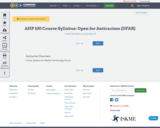
Course Syllabus for Medical Terminology Course
- Subject:
- Health, Medicine and Nursing
- Material Type:
- Syllabus
- Author:
- Open for Antiracism Program (OFAR)
- Date Added:
- 09/27/2022

Course Syllabus for Medical Terminology Course
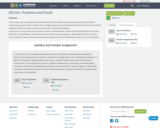
In this course, you will analyze the essential elements of probation and parole by examining the history of sentencing and post-sentence release from its beginnings to the contemporary institution to which it has evolved. Integrated within this study, a variety of topics will be examined through anantiracist lens. The juvenile justice system, probation administration, sentencing, community-based corrections, the theory of rehabilitation, probation and parole officers, special programs, intermediate sanctions, and the future trends and issues related to probation and parole will all be considered with a key focus on social justice.
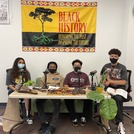
The Open for Antiracism (OFAR) Program – co-led by CCCOER and College of the Canyons – emerged as a response to the growing awareness of structural racism in our educational systems and the realization that adoption of open educational resources (OER) and open pedagogy could be transformative at institutions seeking to improve. The program is designed to give participants a workshop experience where they can better understand anti-racist teaching and how the use of OER and open pedagogy can empower them to involve students in the co-creation of an anti-racist classroom. The capstone project involves developing an action plan for incorporating OER and open pedagogy into a course being taught in the spring semester. OFAR participants are invited to remix this template to design and share their projects and plans for moving this work forward.

Syllabus.
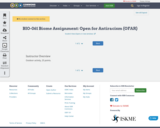
Outdoor activity, 25 points.
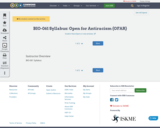
BIO-061 Syllabus
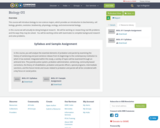
This course will introduce biology to non-science majors, which provides an introduction to biochemistry, cell biology, genetics, evolution, biodiversity, physiology, ecology, and environmental biology.In this course we will actually be doing biological research. We will be working on researching real-life problems and the ways they may be solved. You will be working online with teammates to complete background research and solve problems.
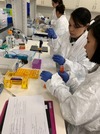
This semester, we will be implementing a group activity where we look at the histology for the leading causes of death while also exploring how these diseases disproportionately affect people of color in America. There are several components of this project that culminate in a video presentation that can be used to inform our Merritt and employer community about these diseases and how they negatively impact us. This project will be done in several steps or 7 Modules as outlined below.
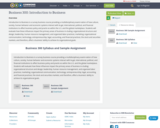
Introduction to Business is a survey business course providing a multidisciplinary exami-nation of how culture, society, human behavior and economic systems interact with le-gal, international, political, and financial institutions to affect business policy and practic-es within the U.S. and the global marketplace. Students will evaluate how these influences impact the primary areas of business in-cluding: organizational structure and design; leadership, human resource management, and organized labor practices; marketing; organizational communication; technology; entrepreneurship; legal, accounting, and financial practices; the stock and securities markets; and therefore, affect a business’ ability to achieve its organizational goals.
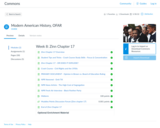
This Canvas shell includes a sample syllabus for a Modern American History course using OER resources. The shell also has two sample modules which include discussion prompts and a sample midterm assignment. Each module has a corresponding announcement that would be sent out at the beginning of the week to remind the students of the work to be done.
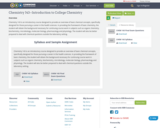
Chemistry 143 is an introductory course designed to provide an overview of basic chemical concepts, specifically designed for those pursuing a career in the health sciences. In providing the framework of basic chemistry, the student will obtain the background necessary for continuing course work in subjects such as organic chemistry, biochemistry, microbiology, molecular biology, pharmacology and physiology. The student will also be better prepared to deal with chemical questions outside the laboratory setting.
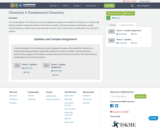
Course Description: This introductory course is designed to prepare the student for Chemistry 1A. Students will develop problem-solving skills related to the nature of matter, chemical reactions, stoichiometry, energy transformations, as well as atomic and molecular structure. This 4-unit course is transferable to CSU and UCSC systems.
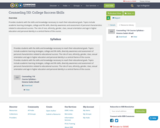
Provides students with the skills and knowledge necessary to reach their educational goals. Topics include academic learning strategies, college and life skills, diversity awareness and assessment of personal characteristics related to educational success. The role of race, ethnicity, gender, class, sexual orientation and age in higher education and personal identity is a central theme of the course.
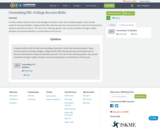
Provides students with the skills and knowledge necessary to reach their educational goals. Topics include academic learning strategies, college and life skills, diversity awareness and assessment of personal characteristics related to educational success. The role of race, ethnicity, gender, class, sexual orientation and age in higher education and personal identity is a central theme of the course.
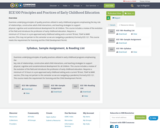
Examines underlying principles of quality practices utilized in early childhood programs emphasizing the key role of relationships, constructive adult-child interactions, and teaching strategies to supportphysical, cognitive and social/emotional development for all children. This course includes a review of the evolution of the field and introduces the profession of early childhood education. Requires aminimum of 10 hours in a pre-approved early childhood setting and a current TB test, TDAP & MMRvaccine. (This may not pertain to this semester as we are navigating a pandemic) Formerly ECE-121. This course meets the requirement for licensing and the Child Development Permit.
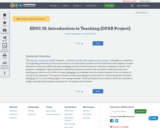
The Open for Antiracism (OFAR) Program – co-led by CCCOER and College of the Canyons – emerged as a response to the growing awareness of structural racism in our educational systems and the realization that adoption of open educational resources (OER) and open pedagogy could be transformative at institutions seeking to improve. The program is designed to give participants a workshop experience where they can better understand anti-racist teaching and how the use of OER and open pedagogy can empower them to involve students in the co-creation of an anti-racist classroom. The capstone project involves developing an action plan for incorporating OER and open pedagogy into a course being taught in the spring semester. OFAR participants are invited to remix this template to design and share their projects and plans for moving this work forward.
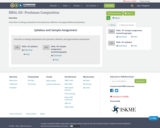
Instruction in writing compositions from personal, reflective, and argumentative perspectives.

In this 16-week composition course, we will explore, discuss, read about, and research food. More specifically, in our time together this term, we will delve into specific and varied aspects of food like food and identity, food and culture, food and the brain, food production, food marketing, and food access. In doing so, we also consider how and why food is the perfect avenue for learning about ourselves and for knowing the fascinating, ever-changing, and often challenging world in which we live.

In this 16-week composition course, students explore, discuss, read about, write about, and research food. More specifically, they delve into specific and varied aspects of food like food and identity, food and culture, food and the brain, food production, food marketing, and food access. In doing so, this learning community considers how and why food is the perfect avenue for learning about themselves, for recognizing and valuing their "already" banks of knowledge, and for engaging in the fascinating, ever-changing, and often challenging world in which they live.

This resource contains assignment details for the co-creation of a class "dictionary" of terms/phrases used by students in their speech communities. Dictionary is in quotes here because it's not a true dictionary; rather, it contains extended definition and analysis of chosen terms, as well as evidence of their use "in the wild" (i.e. in the world). This module also contains a project overview and a warm-up exercise that support the main project, as well as ideas for complimentary assignments for use in a themed course. Please see the "For instructors" page for more on framing this assignment as anti-racist. This work is licensed under CC BY-NC-SA 4.0